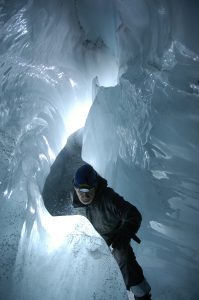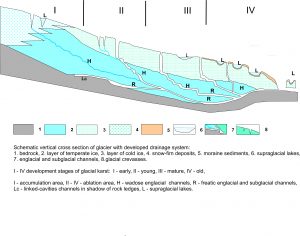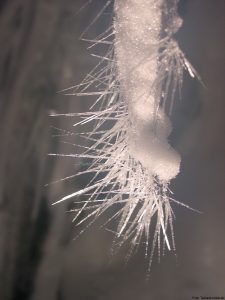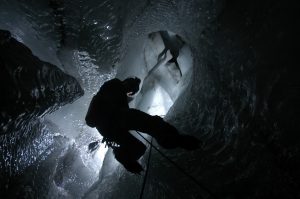Glaciospeleologist
In a very varied area of glaciology research, there is a part hidden in the depths of the glaciers with glaciers – gaps, wells and internal drainage channels, very similar to karst caves. Like karst caves, ice caves require the use of specialized techniques taken from extreme sports such as climbing and speleology.
This section of glaciology is called glaciospeleology. Within Glaciology organizations, it has its Working Group „Glacier Caves and Karst in Polar Regions”. Glaciospeleologists investigate wells and corridor systems, which are water flow paths that result from melting of ice. The magnitude of the ablative water outflow is of great importance in determining mass balance of glaciers.
It also has a purely practical meaning – large glaciers, where the outflow of water takes place throughout the year, it can provide sources of water for human settlements, such as Aldegonda Glacier on Spitsbergen, which supplies water to the Russian Barentsburg settlement.Observations of gaps and cracks in glaciers are important for determining glacial motion dynamics. Similar observations are made of crimping / narrowing slits and ice channels during periods when they are not filled with water.
Observations in the caves of the ice – developed on the contact of the glacier and the rock bed – allow to learn about the processes of glacial erosion and formation of various types of glacial deposits. In addition to valuable scientific data, glaciospeleology provides a great visual experience – vapors and icebergs create fantastic forms, and the transparency of the ice gives excellent optical effects in artificial light. Studying fast-changing systems gives a sense of constant exploration of something new.
- Meander in Cristal Cave(arch. ZBPiM)
- Scheme of glacier drainage system
- Ice forms in Cristal Cave, arch. ZBPiM






 This project (EDU-ARCTIC) has received funding from the European Union’s Horizon 2020 research and innovation programme under grant agreement No 710240. The content of the website is the sole responsibility of the Consortium and it does not represent the opinion of the European Commission, and the Commission is not responsible for any use that might be made of information contained.
This project (EDU-ARCTIC) has received funding from the European Union’s Horizon 2020 research and innovation programme under grant agreement No 710240. The content of the website is the sole responsibility of the Consortium and it does not represent the opinion of the European Commission, and the Commission is not responsible for any use that might be made of information contained.